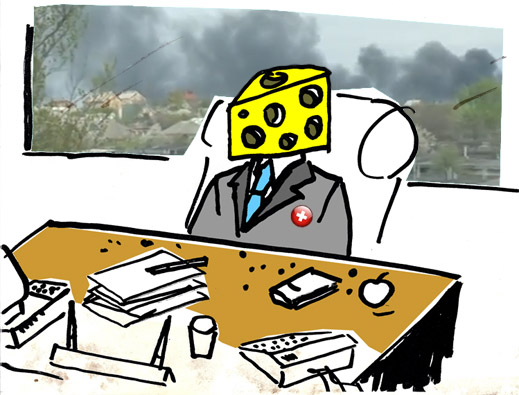
By John Helmer, Moscow
The holes in Emmental cheese are so characteristic of the Swiss brand, their diameters are officially fixed [1] by the US Food and Drug Administration. The reason for the holes is that in fabrication of the cheese, the addition of the Propionibacterium shermani causes the release of carbon dioxide. When the wheels of emmental are broken, the bubbles burst, leaving behind the holes. The Swiss call it the jolly bacterium (P. freudenreichii).
Didier Burkhalter, President of Switzerland, and also Chairperson-in-Office (CiO) of the Organization for Security and Cooperation in Europe (OSCE), hasn’t been feeling so freudenreich lately with these two titles, whose tenures run out, both of them, on December 31.
Burkhalter, 54, from the centre-right Liberal Radical Party, started cheerfully enough when as foreign minister in the Swiss Federal Council, he won enough votes for the annual rotation of the presidency on December 4, 2013. When Burkhalter, a native French-speaker from Neuchatel, is feeling freudenreich, his smile goes up on the right side. When Burkhalter is less freudenreich, his smile goes up on the right side, but his grin turns down on the left. When he becomes anxious, his jaw and lips clench, and his mouth drops on the left side. When Burkhalter is really nervous, his mouth turns down on left and right.
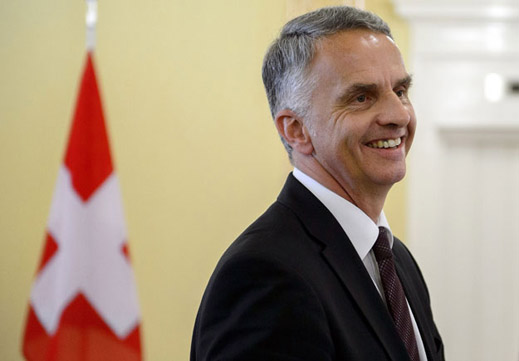
Berne: December 4, 2013

Davos: January 24, 2014, with US Secretary of State John Kerry

Washington: February 25, 2014, with US Vice President Joseph Biden
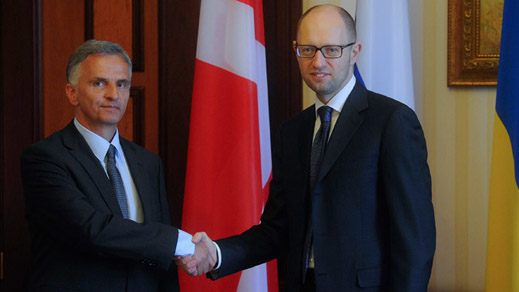
Kiev: April 14, 2014, with acting Ukrainian prime minister, Arseny Yatseniuk, who installed the Danish flag by mistake

Moscow: May 7, 2014, with Russian President Vladimir Putin
On March 21 Burkhalter agreed with the OSCE to create a Special Monitoring Mission (SMM) for Ukraine. He claimed [2] the mandate agreed with the US, Russia, Germany and other members of the OSCE’s Permanent Council was “to contribute to reducing tensions and fostering peace, stability and security. Throughout the country, the mission will gather information and report on the security situation as well as establish and report facts regarding incidents, including those concerning alleged violations of fundamental OSCE principles and commitments. It will also monitor the human rights situation in the country, including the rights of national minorities. Facilitating dialogue on the ground to promote normalization of the situation is a further task of the mission. The mandate of the OSCE Special Monitoring Mission forsees [sic] deployment throughout Ukraine, to the east, south and west of the country.”
On April 14 Burkhalter announced [3] in Kiev that in order for the monitoring and reporting mission “to enhance transparency and the level of accurate information about ongoing developments, the Mission in addition to providing reports for OSCE participating States has also started a daily public reporting.”
Burkhalter delegated the Ukrainian operation to three deputies of Turkish, British and Swiss nationality; in the past all three have been engaged in military pacification of territories at war. The SMM’s public reporting and transparency function was assigned to a Canadian from the western Ukraine with a record of published diatribes against Russia; they stopped when his OSCE salary commenced. Their backgrounds, careers and political orientations were examined here [4].
Burkhalter disclaims personal responsibility for the SMM appointments, and does not reveal which OSCE member governments he consulted before they were named. Through his spokesman in Berne, Burkhalter says: “The Chief Monitor and his two deputies were nominated by their respective state authorities. The appointments followed the usual OSCE procedures. The three dispose of the relevant experiences and qualifications needed to fulfill their mandates in the framework of the Special Monitoring Mission. Special attention was paid to their previous experience in multilateral organizations.”
On May 6 [5], in Vienna, Burkhalter went before his fellow foreign ministers at the Council of Europe to explain what has since been called his, or the Swiss, or the OSCE’s “roadmap” for the negotiated resolution of the conflict in Ukraine. The roadmap, Burkhalter said, included: “international commitment to presidential elections on 25 May; international commitment to the conduct of a nationwide consultative opinion poll on decentralization (in parallel with the elections), which is tied to broad national dialogue, including roundtable discussions in the regions; recommitment to implementing the measures agreed in the Geneva Statement. Security questions will also have to be addressed.”
By reference [6] to the Geneva Statement of April 17, signed by the US, the European Union, Russia, and Ukraine, Burkhalter’s roadmap appeared be comparably balanced. For example, the Geneva Statement’s reference to the OSCE appeared to require the OSCE’s “Special Monitoring Mission [to] play a leading role in assisting Ukrainian authorities and local communities in the immediate implementation of these de-escalation measures” (emphasis added).
When Burkhalter left the Kremlin on May 7, he gave Putin the impression he was sticking to that balance. According to the Kremlin transcript [7], Burkhalter told Putin: “I would very much like to discuss the proposed roadmap with you today, and to look at it in real detail if possible, in order to start its implementation.” Five days later, Putin and Burkhalter spoke by telephone. The Kremlin version of what was said is: “Both sides noted the importance of intensifying OSCE efforts to settle the crisis, particularly by establishing direct dialogue between the authorities in Kiev and representatives from the southeast regions of Ukraine.”
Burkhalter’s version [8] of what was said is different. “In a phone call by Russian President Vladmir Putin later today, Burkhalter was told that Russia was supportive of the Roadmap and of the OSCE’s engagement in Ukraine. Referring to yesterday’s unconstitutional referendum in some locations in Ukraine, Burkhalter emphasized the need for both national and international dialogue regarding Ukraine. He asked the President of the Russian Federation to reinforce earlier signs of Russia’s support for de-escalation and actively contribute to get tangible results in order to strengthen the logic of cooperation. Encouraged by the positive feedbacks, the OSCE has already begun implementation of the Roadmap, Burkhalter said. Ways of OSCE support for the Round Tables and the National Dialogue are being elaborated with the Ukrainian authorities.”
In the OSCE release Burkhalter said he had agreed with Kiev on the appointment of a German, Wolfgang Ischinger, to implement the process of dialogue, or round tables, between the government in Kiev and the separatists, federalists, and Russian-speakers in the south and east of the country. There is no record that Ischinger’s appointment was discussed in the telephone-call with Putin, or approved in Moscow.
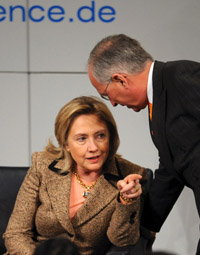 Ischinger (on the left of Hillary Clinton), a former German ambassador to the UK and the US, is known in Germany as an “Atlanticist”, which is diplomatic slang for pro-American. His job as chairman of the Munich Security Conference (MSC) depends on it. In the role Burkhalter had assigned him, Ischinger managed just three round-table sessions – in Kiev, Kharkov and Nikolaev. Burkhalter announced “The launch event [in Kiev], chaired by two former Presidents of Ukraine, Leonid Kravchuk and Leonid Kuchma, allowed for constructive and engaged discussions and set the tone for the following editions to take place in the regions.” The roles Bukhalter endorsed for Kravchuk and Kuchma were roundly criticized by the regional invitees, as well as by groups in the southeast of Ukraine whom Ischinger did not invite.
Ischinger (on the left of Hillary Clinton), a former German ambassador to the UK and the US, is known in Germany as an “Atlanticist”, which is diplomatic slang for pro-American. His job as chairman of the Munich Security Conference (MSC) depends on it. In the role Burkhalter had assigned him, Ischinger managed just three round-table sessions – in Kiev, Kharkov and Nikolaev. Burkhalter announced “The launch event [in Kiev], chaired by two former Presidents of Ukraine, Leonid Kravchuk and Leonid Kuchma, allowed for constructive and engaged discussions and set the tone for the following editions to take place in the regions.” The roles Bukhalter endorsed for Kravchuk and Kuchma were roundly criticized by the regional invitees, as well as by groups in the southeast of Ukraine whom Ischinger did not invite.
Sergei Lavrov, the Russian Foreign Minister, said the Kiev round table was not what the Kremlin understood Burkhalter to have been promising. “Frankly, I don’t know what exactly is the composition of the roundtable which has been not very loudly announced, as I understand, in Kiev. We believe that for this national dialogue to succeed, it is absolutely necessary to ensure equal participation of all the regions of Ukraine, not only east and south, obviously, but also the regions of the west, where we also have some issues related to self-determination of minorities.”
That was on May 14. The next day, three of Lavrov’s subordinates declared almost simultaneously that Ischinger wasn’t doing his job, and that Burkhalter’s special monitoring mission wasn’t neutral. In Vienna Russia’s OSCE envoy, Andrei Kelin, said: “We see sterilization of the mission’s reports due to an extensive pressure on it (the mission) on behalf of the Kiev authorities and on behalf of those, who pitched them (the authorities) to power, namely the United States and the European Union. There is no other functioning international organization there [in Ukraine]. If we remove the mission, who do we turn to then? It is impossible to turn to the illegal authorities in Kiev.”
In Moscow Konstantin Dolgov, the Russian Foreign Ministry’s human rights representative, reported: “We have thoroughly studied the reports of the Office for Democratic Institutions and Human Rights (ODIHR) and the High Commissioner on National Minorities of the Organization for Security and Cooperation in Europe (OSCE). The report distorts the real state of things in Ukraine. A blind eye has been turned on blatant violations of fundamental human rights, including freedom of expression, by the Kiev authorities, which enjoy the support from the West. The OSCE mission seems to have no interest in the destructive role of the Maidan activists and the punitive operation against civilian population in Ukraine’s southeastern regions. Instead, the authors, upon the slimmest of evidence, speak about alleged human rights violations in Russia’s Republic of Crimea and Ukraine’s southeastern regions.”
The Russian criticisms of the OSCE avoided mentioning Burkhalter by name. But Burkhalter’s public dismissal of the May 11 referenda in Donetsk and Lugansk was the target of attack by the Foreign Ministry’s spokesman, Alexander Lukashevich, also on May 15. “It is impossible to ignore such huge events, especially in a country that has seen so many important developments of late. These two regions have a total population of 7 million people. That makes 16% of Ukraine’s population. It is more than in some European countries or US states…The hushing up of obvious facts does not contribute to launching a national dialogue in accordance with the Geneva agreements.”
In Washington the State Department briefer, Jen Psaki, dismissed the Russian concerns. “I’m not aware of those complaints”, she said on May 22.
When one of the OSCE field bulletins from Lugansk publicly reported that “rockets hit the occupied regional administration building. Based on the SMM’s limited observation these strikes were the result of non-guided rockets shot from an aircraft,” the State Department spokesman ignored it [9]. “There are conflicting reports about this. I actually hadn’t seen an OSCE statement, so let me check on that. And of course, in general, [we] welcome the restraint the Government of Ukraine has shown in the face of overwhelming and unacceptable Russian interference and see no credible evidence to the contrary.”
A Voice of Russia broadcast on June 9, repeating a Kommersant newspaper publication, indicated that Ischinger’s onesidedness contributed to his quick exit from the round-table job. As he departed, Ischinger published [10] a self-endorsement in the Financial Times. “The pre-election round tables did help to calm things down and create a more positive atmosphere of national purpose.” The next step, according to Ischinger, was someone else’s to take. “A contact group could support Ukraine to define its place in the European security architecture, in building trust, and in reducing the recent tensions with Russia. The key point is that Ukraine cannot and should not have to sit at the table with Russia alone, and such a contact group is the best mean available to include Russia in this process.”
While no replacement for Ischinger has followed, and no new round table either, Burkhalter has announced the appointment of a Swiss diplomat, Heidi Tagliavini, as the OSCE representative for the “contact group”. This also comprises the Ukrainian Ambassador to Germany, Pavel Klimkin, and the Russian Ambassador to Ukraine, Mikhail Zurabov.
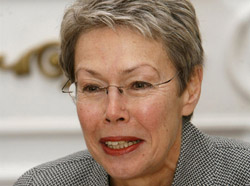 Tagliavini is known in Moscow as the author of an independent assessment [11] of the causes of the war of August 2008, which resulted in the defeat of Georgia’s forces after they attempted to invade South Ossetia. Tagliavini concluded that Georgia had provoked the war. According to Burkhalter’s spokesman, Tagliavini’s appointment to the
Tagliavini is known in Moscow as the author of an independent assessment [11] of the causes of the war of August 2008, which resulted in the defeat of Georgia’s forces after they attempted to invade South Ossetia. Tagliavini concluded that Georgia had provoked the war. According to Burkhalter’s spokesman, Tagliavini’s appointment to the
contact group had been explicitly requested by the new Ukrainian president Petro Poroshenko. Tagliavini’s appointment to the new OSCE role in Ukraine has been criticized [12] by Georgia’s ex-president Mikheil Saakashvili. He has called her «подсунуть свинью» (a pig in a poke).
Said [13] the Russian foreign ministry: “Russia has always backed the ‘roadmap’ for the settlement of the crisis in Ukraine, proposed by the Swiss chairman of the OSCE in line with the Geneva accords of April 17. We are working on the assumption that Heidi Tagliavini will be actively involved in the implementation of the key provisions of said ‘roadmap’, primarily the development of stable agreements on the immediate cessation of violence and the creation of conditions for the beginning of true dialogue in Ukraine involving all political forces and regions of that country.”
Burkhalter has told Poroshenko and Yatseniuk, according to an OSCE release [14], that he wants “to assist the authorities in establishing a program for the disarmament of illegally armed groups. Furthermore, they talked about the situation in the east of the country, particularly also the situation regarding the two missing teams of the Special Monitoring Mission. Burkhalter, calling for their unconditional release and stressing that getting them free was a priority for the OSCE and the Swiss Chairmanship, expressed his gratitude to Poroshenko and Yatsenyuk for the close co-operation in this regard.”
Burkhalter was asked to clarify the balance he wants the OSCE to adopt in eastern Ukraine. The questions were submitted to him at the Federal Palace in Berne, His spokesman, Sonja Isella, then responded:
Q: President Burkhalter has made several public statements endorsing the sovereign right of Ukrainian forces to attack civilian areas of the country, particularly the districts in and around Slavyansk, Lugansk, and Donetsk. Is it President Burkhalter’s view that the Ukrainian military operations in those areas are under the control of the government in Kiev? What is Mr Burkhalter’s assessment of the reasons and justifications in international law for the destruction by these operations of water, electricity, heating, food supplies, telephone, and other infrastructure serving civilian life in these areas?
A: “We are not aware of any such statements by the CiO. The CiO, since the beginning of the Ukrainian crisis, has called for dialogue and de-escalation in order to promote a peaceful resolution of the situation”.
Q: What is the OSCE count of the numbers of refugees flowing out of the areas of military engagement, and what is the OSCE’s assessment of the causes of this outflow?
A: “Please refer to the OSCE press section http://www.osce.org/press/contacts [15].”
Q: Yesterday [June 11] Foreign Minister Lavrov told [OSCE] Secretary-General Lamberto Zannier that “we consider counterproductive any attempts ‘to pick and choose’ separate elements from the ‘road map’, without paying attention to the others, or to substitute for this document new plans having unilateral and unbalanced character. We are convinced that the Acting Chairman of OSCE [Burkhalter] – the author of ‘road map’ – and his special representatives, whom he appoints and still can appoint, must adhere strictly to the balanced, compromise, integrated approach stated in the specified document.” How does President Burkhalter respond to this criticism?
A: “We do not comment on media reports.”
Burkhalter was then asked to amplify his answers where the spokesman had been misleading or mistaken.
Q: In order for you to respond to Questions 2 and 3, I provide you with the following excerpt of President Burkhalter’s speech to the Foreign Affairs Council of the European Union on May 12 — https://www.news.admin.ch/message/index.html?lang=en&msg-id=52916 [16] “It is imperative that the Ukrainian authorities respond in an appropriate manner to this challenge. And it is important that we support them in this task. While we emphasise the legitimacy of peaceful protest we also acknowledge the right of the government to use force to protect people and infrastructure against violent acts. We emphasise that any such use of force must be proportionate.”
Q: In response to Question 4, you have provided a link which is a list of names of OSCE functionaries. Would you please explain how this responds to the question asked?
Q: In order for President Burkhalter to answer Question 5, and respond to Foreign Minister Lavrov’s statements, I refer to the verbatim record of the Minister’s remarks, issued by the Russian Foreign Ministry at 1400H yesterday June 11 — http://www.mid.ru/brp_4.nsf/0/AB223E601B9F6AD844257CF4004F1F43 [17]. In the event that your Secretary-General lacked a note-taker or interpreter, I invite you to make your own translation of the Russian, noting that the English translation I provided you was a courtesy, not a “media report”.
Burkhalter and his spokesman have refused to reply.
Two days late, Burkhalter authorized the OSCE website to disclose that Secretary-General Zannier had met Lavrov in Moscow.

According to the release [18], there had been no discussion of the OSCE’s balance. “On 11 June, [Zannier] met with Minister Lavrov in Moscow to exchange views on the OSCE’s engagement in Ukraine as well as on other issues on the OSCE agenda. He welcomed the ongoing work in Kyiv of the recently-established tripartite Contact Group that includes representatives of Ukraine, the Russian Federation and the Swiss OSCE Chairmanship. Special attention was paid to the situation with the missing staff of the OSCE Special Monitoring Mission in Ukraine. ‘We call for the immediate and unconditional release of our monitors,’ the Secretary General stressed… In his meetings, Zannier stressed the vital importance of inclusive political dialogue and the cessation of violence in south-eastern Ukraine. ‘Weapons should be removed from the streets and violence should be replaced with national dialogue,’ he said. ‘The OSCE stands ready to contribute to the establishment of a disarmament programme in order to de-escalate the situation in the country.’”
Burkhalter is refusing to provide the OSCE’s estimate of the number of refugees from the areas of eastern Ukraine currently under air, artillery and infantry arms fire. According to the OSCE releases [19], there have been refugees in Kosovo, Serbia, Georgia, Abkhazia, and other parts of Europe and the former Soviet Union — but so far not in Ukraine. Instead, there are “internally displaced persons (IDPs)”, forced to flee the combat zones to other Ukrainian districts; and “displaced persons” who have crossed into Russia. Zannier, the OSCE announced on June 13, “was in Rostov-on-Don in the south of Russia where he met with representatives of the local administration and visited a collective centre for displaced persons from south-east Ukraine.”